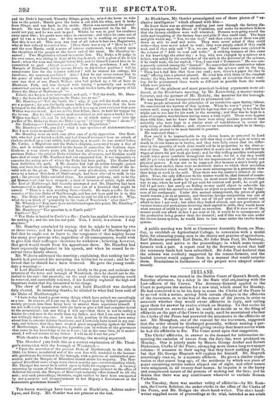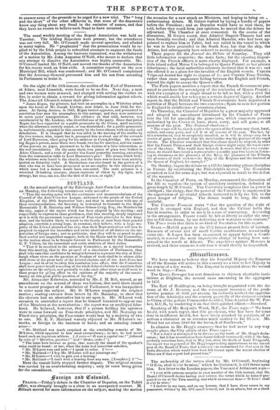IRELAND.
Some surprise was created in the Dublin Court of Queen's Bench, on Saturday afternoon, by a delay in the State trial originating with the Law-officers of the Crown. The Attorney-General applied to the Court to postpone the motion for a new trial, which stood for Monday. He had conceived it to be his duty to cause the Clerks of the Peace to be served with a notice, setting forth certain charges in the affidavits of the traversers, as to the loss of the names of the jurors, in order to. ascertain whether they would swear affidavits in reply, and calling upon them for answer by twelve o'clock on Monday. To that notice he had received no answer ; and he could not decide as to the filing of affidavits on the part of the Crown in reply, until he ascertained whether the Clerks of the Peace had answered the statements in the affidavits or not. Mr. Monaghan, one of the counsel for the traversers, suggested that the order should be discharged generally, without naming a par- ticular day ; the Attorney. General giving twenty-four hours notice when. he had the affidavits to file. The Court acted upon that suggestion.
The Clerks' affidavits, in answer to the demand for information re- specting the omission of names from the Jury-list, were produced on Monday. One is jointly made by Messrs. George Archer and Robert Dickenson, Clerks of the Peace, occupying more than a long newspaper column : it amounts to their saying that they know nothing about it, but that Mr. George Magrath will explain for himself. Mr. Magrath. accordingly does so, in a separate affidavit. He gives a similar expla- nation to that stated long ago, of the accidents by which one piece of paper containing certain names slipped out of sight, and other names. were misplaced, in all twenty-four names. he imputes it to the hurry and complicated nature of the process of making out the lists; and he denies that there was any contrivance whatever to exclude Roman Catholics.
On Tuesday, there was another volley of affidavits—by Mr. Kem- mis, the Crown Solicitor, the under-clerks in the office of the Clerks of the Peace, and Mr. Hodges the short-hand-writer. The short hand- writer supplied notes of proceedings at tha trial, intended as ma eriala
to answer some of the grounds to be urged for a new trial. The' long and the short" of the other affidavits is, that none of the deponents know any thing about any fraud in the omission of names, and that they have no reason to believe such fraud to have occurred.
The usual weekly meeting of the Repeal Association was held on Tuesday. The leading Repealers were present, but the attendance was not very full. Mr. O'Connell made several speeches, and alluded to many topics. He " prophesied" that the prosecutions would be re- plied to by the Irish people in redoubled attempts to augment the funds of the Association. Among the business transacted, was the withdrawal of a motion by Mr. John Augustus O'Neill, who meant to declare that any attempt to dissolve the Association was highly censurable. Mr. O'Connell lauded Mr. O'Neill, and moved the thanks of the Association for his recent work on Irish evils. A committee reported on the new Municipal Bill, which was condemned; and Mr. O'Connell complained that the Attorney-General prevented him and his sou from attending in Parliament to resist it.
On the night of the 18th instant, the stables of the Earl of Danraven, at Adare, near Limerick, were found to be on fire. Next day, a man and two women were arrested, and charged with setting the stables on Sre, in order to obtain a reward for giving information against others. The Limer-ick Chronicle relates their plot- " James Regan, the prisoner, had been an accomplice in a Wbiteboy attack upon the house of Mr. Joseph Lindsay, near Adare, in June 1842, for fire- arms. At Spring Assizes, in 1843, Regan turned approver, and prosecuted to conviction four men his accomplices in this outrage, and they were sentenced to seven years' transportation. His evidence on that trial, however, was corroborated by Mr. Lindsay, who identified one of the party. Since that period Regan has been supported as a public prosecutor by the Crown, until recently, when the allowance entirely ceased, or was diminished ; for a public prosecutor is, unfortunately, regarded in this country by the lower classes with enmity and detestation. It is charged that he was aided in the burning of the stables by the two women, who, report has it, prompted him to shoot one of the servants of Lord Dunraven, when going for his mistress to Curraghbridge. On search. ing Regan's person, some flints were found, two lue.fer matches, and the names of ten persons on paper, presumed to be the victims of a false information, as the real incendiaries. On the same night, two panes of glass were broken in Adare Church, and a train of powder was found yesterday morning, extending from the communion-table to Lord Dunraven's pew! The stones which broke the windows were found in the church, and the train was to have been secretly ignited on Saturday night. A blunderbuss was also found in the garden of a man who was to have been prosecuted as an accomplice in this infernal plot, which none hut a demon would have concocted. The male prisoner is a wretched ill-looking creature, almost destitute of vision by day-light, and, strange, but true, can see, like the bird of ill omen, at night."



























 Previous page
Previous page